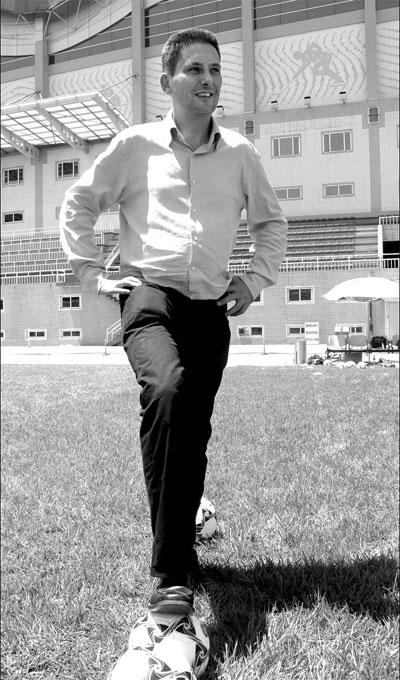Simons says sort out soccer
|
Rowan Simons on the pitch in a Beijing stadium. Wang Ru / China Daily |
An Englishman who has lived in Beijing for 23 years spells out why the beautiful game is not so attractive in China, Wang Ru reports
Millions of passionate Chinese soccer fans are looking forward to a classic final World Cup match between Spain and the Netherlands. But if they look at domestic soccer the picture isn't so bright.
China's professional soccer league is struggling to emerge from problems that include gambling and corruption.
Rowan Simons is an Englishman who has lived in China for 23 years. He founded a football club in Beijing with over 100,000 registered members and a futsal league with 100 amateur teams.
He has strong views about what needs to be done to make Chinese football a force in the future.
Speaking fluent Mandarin in a Beijing accent, occasionally peppered with slang and dirty words, Simons says "we" when he talks about the Chinese game.
"How can our kids have hope for football when we (China) are only ranked 84th in the world?" he asks.
During the week, part of a Premier Skills program, three professional soccer coaches from England have been coaching physical education teachers and students from schools in Beijing. Under the burning sun, Simons joined in.
He believes soccer can only thrive when all is well at the grassroots level.
In 2001, Simons established the first joint venture soccer club in China - Wanguoqunxing. Every evening in Chaoyang Park, Beijing, there are games.
Simons and his club have opened football classes for kids. Although many parents sent their children to the classes to learn English from the English coaches, Simons is still happy about it.
"No matter what country I live in, I would take the country's football development as mine," Simons says, "I believe football is a language all human beings understand."
In 1987, Simons came to Beijing to learn Chinese. He was excited about embracing a new culture, but also surprised to find there was no football club in Beijing.
"London has thousands of football clubs, both amateur and professional."
The Londoner fell in love with soccer when he was four. "All kids naturally show a strong interest in rolling a ball," he says.
Soccer is a big part of his life. He played in school teams, read soccer magazines and became a West Ham United fan.
In the 1990s Simons was a soccer presenter on Beijing TV and this established his credentials as an expert on the local game.
At the beginning of 1990s, Chinese soccer went professional and appeared to thrive, but Simon was pessimistic: "It was ridiculous that a football league was sponsored by a tobacco company."
After the tobacco company ceased sponsoring the league it declined and Simon believes China making it to the World Cup in 2002 was purely luck.
"Chinese football doesn't have roots at all, so it will easily break down. In England, the most important thing about football is not the national team or Premiership, but the teams in communities and schools," he says.
Simons tried to copy this model and transfer it to China but came across some fundamental problems.
"In the UK, if you build a pitch but no one plays on it, it is a shame. But in China, many football pitches never open except for an official inspection and the rents are high," he says.
"Football is a people's game. But in the People's Republic of China, we see a fast growth in the number of golf and tennis courts - both are 'noble sports' -- but not football pitches."
He used to rent farmland in Beijing to make a pitch for his club teams. But it was too expensive to continue.
Last year, his club and an American charity organization launched a program to teach soccer to schools of migrant workers' children. They provided jerseys and shoes to the children for free. They also wanted to rent a pitch, but were told they had to pay 500,000 yuan ($73,735) a week.
Last year, the Chinese government tried to clean up corruption in professional soccer. Officials appear to realize the importance of the game. As former Chinese leader Deng Xiaoping pointed out decades ago: "Childhood should be the beginning of football".
"The China Football Association received 10 million euros (86 million yuan) in overseas donations, but they spent it by sending 100 young players to big football clubs in Europe. It's so stupid," Simons says.
"The European clubs just wanted the money, they won't give them any chances if they don't reach the level.
"Many schools in Beijing have selected dozens of children and established a football team quickly, in order to respond to the administrative order, but how about the rest of the students? You can't just close the door on the majority."
Simons has written letters to Sepp Blatter, president of FIFA, questioning the legitimacy of the Chinese Football Association, the official organizer of professional soccer in China.
He has written a book, Bamboo Goalposts, a hilarious and insightful account of what it's like to live, work and play football in China, in the past two decades.
Simons owns a media company in Beijing, taking Chinese TV programs to TV Festival de Cannes twice a year. He admits he is a businessman hunting fortune in a vast market.
His soccer club is now operating without making a loss and Simons is searching for investment in a Beijing soccer academy.
He requires 4 million yuan ($590,500) to build a paradise for soccer fans. It will have 16 pitches for futsal games and other leisure spots, including pubs and restaurants.
"It would be a paradise for all football lovers to share the sheer happiness of football," he says.
(China Daily 07/10/2010 page11)















